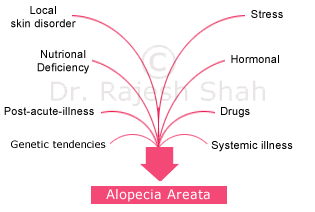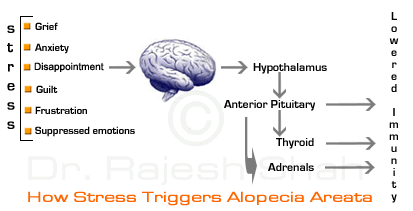Causes and Triggers - Alopecia Areata
The causes of Alopecia Areata are not fully understood. Alopecia Areata is considered to be an auto-immune condition in which the immune system of the body (which protects the body from bacteria, viruses, allergens, etc.) mistakenly attacks the hair follicles and destroys them. This leads to hair loss in the affected area. This abnormal behaviour of the immune system is understood to be guided, influenced and triggered by multiple factors.

The exact cause, of why hair follicles undergo this kind of destruction, is not known but a genetic component to this is suspected. The family history of Alopecia Areata or any of the other auto-immune diseases (such as hypothyroid, diabetes, cancer, ulcerative colitis, rheumatoid arthritis, etc.) is often seen in many cases, suggesting a role of the genetic element. In addition to the genetic predisposition, certain triggering factors may bring on the onset of this condition. Prolonged underlying stress often predisposes some patients to develop auto-immune process leading to Alopecia Areata. However, stress may not be the cause in every case. Alopecia Areata treatment has to take into account the underlying causes.
Some other common causative and trigger factors that can contribute to the development of Alopecia Areata have been mentioned below:

One or more of the following factors may be found responsible in cases of Alopecia Areata:
- Hormonal cause: High levels of the male hormones (in men as well as in women) can trigger the onset of Alopecia Areata
- Thyroid disorders
- Drugs and medications:
- Commonest in this group are chemotherapy drugs, certain medicines used for gout, arthritis, depression, hypertension, ischemic heart disease, etc
- Large doses of Vitamin A can also trigger Alopecia
- Oral contraceptive pills
- Chemical treatment of hair, exposure of hair to excessive heat
- Low levels of iron
- Poor protein intake
- Physical stress: After undergoing some major surgery, or due to some chronic illness, rapid weight loss due to dieting
- SLE (Systemic Lupus Erythematosus)
- Fungal infection of the scalp
- Lichen Planus on the scalp (with scarring)
Written & Approved by-
Dr. Rajesh Shah
M.D. (Hom.)